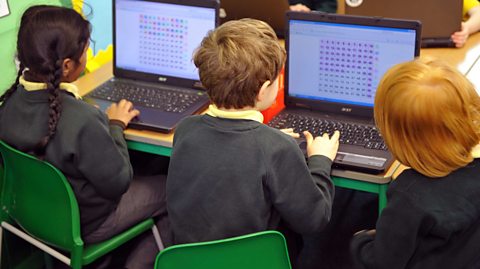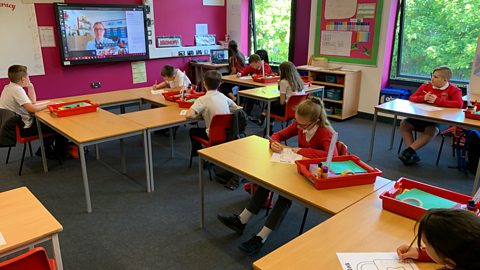
My advice to all at this difficult time is to be kind to yourself and learners. Find ways to look after your wellbeing and minimise your workload.
By assistant headteacher Josiah Isles
The past year has been one of the most turbulent in the lives of learners, teachers, and their families. Learning and teaching remotely, national lockdowns, and bereavement within families and extended families, have certainly taken their toll on our wellbeing.
Our fortitude has been tested relentlessly as educators, both in our relationship with the media, and in our professional and personal lives. The impact on mental health will be felt strongly in the upcoming generation of young adults.
The ways in which we are raising our children are changing and adapting due to the pandemic, and itÔÇÖs our responsibility to ensure that these changes are as positive as possible.

If youÔÇÖve spent some time in a school over the course of this academic year, you might understand why exams taking place this year were deemed to be unfair. At my school in Bolton, we calculated that by the end of the first term, learners in my school had collectively lost at least 18,427 days of education: on average, 18.6 days per learner.
Exam cancellations might have come as a relief to teachers and learners across the country, but now that we have some clarity on how grades will be awarded in England (with similar approaches also being taken in Scotland, Wales and Northern Ireland) what can we, as teachers, do in preparation?
Develop a consistent approach within our schools
ItÔÇÖs likely that the exam boards will provide materials that will be compulsory to use, but to be as accurate as possible in our predictions, we will need to develop further systems within school to gather a breadth of data. How we gather this data will only partially rest on material from the exam board. We have a real opportunity to influence the lives of our learners, based on the quality of the work they have been producing, at one of the most testing times in educational history!
The assessment and subsequent moderation process of whichever system is developed in your school may cause a substantial workload increase for staff. Evidence from the exam boards suggests that to mark 1000 exam scripts takes, on average, 40-50 hours from experienced examiners. Involve staff in the process through a working group to ensure the system is accurate but also as efficient as possible. Working with the union representatives will be crucial to ensure parity across schools and that the expectations of staff are realistic and fair.
Prepare our learners for what we are likely to expect them to produce
Formative assessment will feed into the breadth of evidence. Remote learning has, in many cases, been providing excellent conditions for students working independently. Where students canÔÇÖt work independently without distractions, it is essential that they are invited into school to ensure they are not disadvantaged. Communicate to learners how they will be assessed (once confirmed by DfE/Ofqual) and emphasise the value of the efforts of their current endeavours.
Work collaboratively with other schools and colleges locally and nationally
In the first national lockdown, there was a suggestion that schools work together to provide provision for the key workers and vulnerable children in schools. This wasnÔÇÖt feasible, but the premise of us ÔÇÿall being in it togetherÔÇÖ as a local community is so empowering.
Meet with your local collaborative or LA consortium and discuss how you can support each other. Schools in our locality will understand our contexts better and will often serve the same families, so joined up thinking can really help.
An understanding of what other schools locally are doing will be important when the appeals process starts in summer, as learners will often compare their experiences to other that of learners in other schools.
How can we support learners?
Research suggests that the pandemic will affect everyoneÔÇÖs mental wellbeing, particularly vulnerable groups such as children. Recent research in the also suggests that there has been a rise in anxiety, depression and engaging in harmful behaviours such as self-harming.
Schools have been really creative at getting out into the community to reduce this sense of anxiety among students caused by the exam cancellations and the remote learning experience. The work to reduce adverse effects on mental health has included:
- Breakfast deliveries
- School minibus ÔÇÿdrop offsÔÇÖ of food and resources for learners
- Goody bags of reading books and chocolate hung on school fences for learners to collect
- On site food banks
- Regular form tutor contact
- │╔╚╦┐ý╩Í visits
- Deliveries of IT resources
- Bereavement support
Communicate to learners how they will be assessed and emphasise the value of the efforts of their current endeavours.
How can we reduce learner ÔÇÿexamÔÇÖ anxiety?
Psychiatrists from the Priory and the NHS have written about the importance of emphasising the bigger picture, life skills and finding a focus (or distractions). As teachers spending most of the day with learners in a virtual setting, we can really help with this. Physical Education is even more important for mental well-being and the temptation to use core PE lessons for catch up work should be avoided.
The work of pastoral staff in school at this time is essential as they use their relationships to support learners, and regular contact with learners by form tutors will also be invaluable. The role of the form tutor is pivotal in allaying exam anxiety and keeping learners focussed on the bigger picture.
For disadvantaged learners, there are many issues that we struggle to solve; we need to focus on the issues that we can assist our learners with.
One of the barriers to the success of disadvantaged learners that we can fix currently is access to devices to work on and a stable internet connection. Laptops and wi-fi routers are available from the DfE and if you have run out, reapply! In addition, some mobile network companies are supplying data SIM cards, free access to wi-fi hotspots, or extra data to learners.
It is worth checking with your school IT manager if they are replacing any desktop computers around school. Rather than recycle, get these out to learners.
Appeal to the community to support the school if they have older devices gathering dust that learners could use. There have been a number of local councils that have set up donation sites for schools to ensure that enough devices are available for learners, so this is also worth checking in your area.

Look to the good
The confirmation of the cancellation of the exams has lifted an excessive psychological burden from the minds of the impacted learners. It shows an acknowledgement of the huge barriers to learning that the learners have faced over the past year (with more still to come).
With the funding put into schools in the form of Covid catch up funding, there has been the opportunity to ensure that learners have the necessary electronic resources, and the potential from the National Tutoring Program is developing, although this may not bear fruit until next year.
There is a growing sense of engagement and empowerment amongst learners that can be built upon. The need to spoon-feed knowledge is reducing as learners and teachers embrace new, and sometimes more independent ways of teaching, learning and working.
My advice to all at this difficult time is to be kind to yourself and learners. Find ways to look after your wellbeing and minimise your workload. Have those conversations with learners that are really important about how they are feeling and the problems that they are facing.
Build the development of agency in the learners to prepare them for the uncertain world that will emerge post-Covid. A particular focus for disadvantaged learners will be how the changes in the world due to the pandemic have affected career availability and skill set requirements, and so this is something they need to be prepared for.
In my years as a teacher and leader, I have never been more proud of the profession and its practitioners. Teachers have been plunged headfirst into a new world, where their role now includes administering and running medical tests, and teaching remotely using a vast array of new techniques and technology.
At my school, we have helped over 300 families to get online and access the remote learning provision, and this is being replicated all across the country as schools provide resources, food and emotional support to learners inside and outside of the school building (we never closed!).
As there is now clarity about how final grades for learners will be given and assessed, I am confident that we will continue to comfort ourselves with the dignity of our profession, whilst always doing the best we can for our learnersÔÇÖ emotional wellbeing.


If youÔÇÖre a teacher in need of support, call free and confidential 24/7 emotional support helpline on 08000 562 561.
The │╔╚╦┐ý╩Í is not responsible for the content of external websites. By clicking the link to access the external website you will be redirected to a site controlled by Education Support. Please note that the │╔╚╦┐ý╩Í is not the data controller of the personal data you enter into the external website and it is not responsible for the services provided by any external organisation. When using an external website, you are subject to their Terms and Conditions and Privacy Policy.

How to make virtual parents' evenings a success. document
Tips on managing parents evening in a time of video calls and social distancing.

Tips to help children regain lost learning. document
How teachers are dealing with the continuing disruption caused by Covid-19.

Lessons in resilience: Earning your stripes. document
Dr Emma Kell ÔÇô Teacher, Doctor of Education and author of 'How to Survive in Teaching', shares her top tips for developing resilience.
